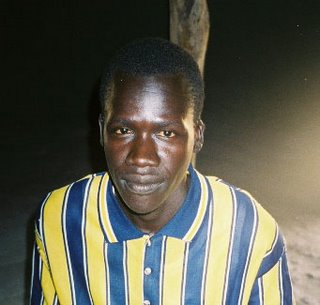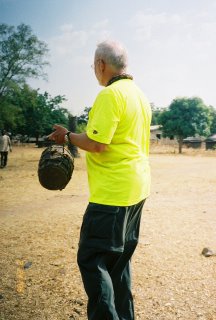Youth Leaders' Meeting (Sat., 25 Feb.)
On Saturday, Archdeacon Robert and Sandy (plus many Lui clergy) went out to visit other archdeaconries.
Father Bob, Rick, and I remained in Lui. We had learned Friday afternoon that Bishop Bullen wanted us to lead a workshop for the diocese’s youth leaders.
We met in the diocese’s payut. [If I understand correctly, a “payut” is a tukel that is meant for group meetings. There’s no difference in its structure – only in its use.]
People had walked very far. Charles walked 40 miles; many had walked 32 miles to get here.
In mid-morning of this session, Gordon called us away, because the “authorities” had come into the village and wanted out SPLA/M passes. Rick & I turned ours over, but Father Bob couldn’t find his. It turned out, this was not a problem. The local military come through the village from time to time to collect travel passes. But they didn't seem to care that Father Bob couldn't find his.
Father Bob began the youth leaders' session by asking them to describe their ministries and their goals. Danistan  – one of the first to speak – said he has about 1,876 youth in 3 parishes, and wants to bring them to Christ. He has been working as youth minister since 1999. Each of his parishes has about 7 small churches or “Christian Centers.” He rotates visits among them, teaches, and preaches. His work with them consists of “filling them with the Word of God,” practicing songs to sing in worship, working in the youth garden, crafts (make stools, baskets, etc.), and “working for people who can’t work themselves.” Other youth ministers echoed similar situations, goals, and activities.
– one of the first to speak – said he has about 1,876 youth in 3 parishes, and wants to bring them to Christ. He has been working as youth minister since 1999. Each of his parishes has about 7 small churches or “Christian Centers.” He rotates visits among them, teaches, and preaches. His work with them consists of “filling them with the Word of God,” practicing songs to sing in worship, working in the youth garden, crafts (make stools, baskets, etc.), and “working for people who can’t work themselves.” Other youth ministers echoed similar situations, goals, and activities.
One interesting theme came out of the participants’ statement of goals for this workshop. Time after time, they spoke of their desire to understand the “deeper meaning” of Scripture. It’s clear that this group is very savvy in strict Bible reading. But they have not been given tools for deeper interpretation/exegesis, and they want that.
After hearing all the youth leaders discuss their ministries, goals, and priorities, Father Bob chose to talk with them from Isaiah 6:1-8 (the call of Isaiah). As he talked with them about that passage, I saw and heard things that truly surprised me. Some of the youth leaders were appalled that the angel would take a hot coal and place it upon Isaiah’s lips. As I saw them recoil, I sensed this was because they have lived with torture and seen it first-hand, and this passage sounds (on a literal reading) like the angel was torturing Isaiah. Another of the youth leaders raised the question about whether this story was “Real” or a dream, and this led us into a discussion of the layers of “real” and a discussion of literal, factoid “truth” vs. real but non-literal “truth.” I got the impression that this was unusual for them – that they were not accustomed to studying the Bible in ways “beyond” or “beneath” the literal meaning of Scriptural passages.
And a part of me replied: No wonder the Anglican Communion has come to such an impasse!
Another youth leader talked about the need to keep the youth from “going back to darkness.” I immediately heard echoes of Darius’ sermon earlier at the SP chapel service. These really are people who have just embraced Christianity in the last generation or so. Witchcraft and animist religions are just over their shoulders. They believe in Christ. And they believe in the peace that Christ brings. And they hope for the civil peace that the Comprehensive Peace Agreement should bring to Sudan. Sometimes, those two -- spiritual peace and political peace -- get pretty blurry between them, so that there’s a fear that if the civil peace should break down, the people’s belief and faith in Christ might also break down. Or at least that’s the fear I sensed they were expressing.
Several of the youth leaders named “transportation” as a need/concern. To me, this was initially jarring. After all, the Diocese of Lui is (more or less) only about 50 by 70 miles -- much smaller than the Diocese of Missouri. But they only travel by foot – with a few traveling by bicycle. For them, it’s a three-day journey to get everybody together for a meeting in Lui. This would be the equivalent of us Americans having a national – or even international – gathering. We in Missouri complain of the difficult of incorporating St. Louis congregations with the “out-state” congregations. But for them, it’s a major challenge just to assemble people every month or so.
We took a break for lunch. After just these short hours in Lui, we had learned that the Moru call an assembly by beating a drum (since they do not have clocks/watches).
 So Father Bob showed he was eager to get on with business!
So Father Bob showed he was eager to get on with business!
There was a point where Father Bob asked them to prioritize their training/continuing-education needs. They prioritized them this way:
-- “going deeper into the Bible” or “beyond the literal”
-- leadership training
-- how to build Church school (Bible study) for young Christians
-- how to provide pastoral care for people traumatized by the wars – and how to care for people who have lost all family members and have no one to care for them
As we travel around the diocese, over and over again we hear the need for theological education. This group certainly confirmed that need.
At one point they sang us a song, and the women broke into that wild, high-pitched “keening” which I have described as “ululation.” Father Bob asked them what they call it. They call it “keh-REE-yay.” And they described it as a sound that just “breaks out” when the Spirit is too full. I sure can understand that!




No comments:
Post a Comment